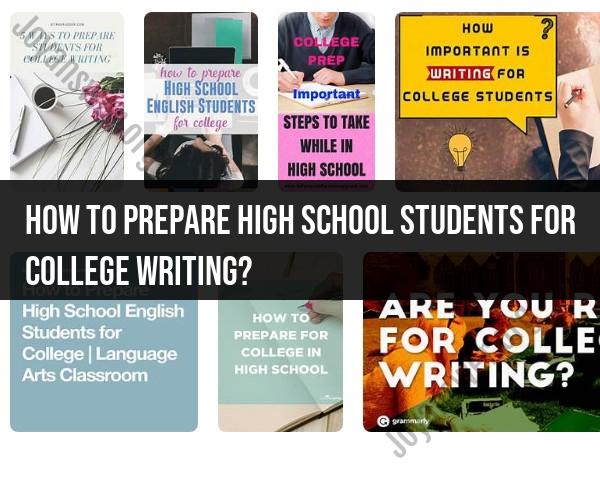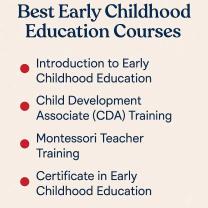How to prepare high school students for college writing?
Preparing high school students for college writing success is essential, as strong writing skills are crucial for academic and professional success. Here are several strategies to help high school educators and students prepare for college-level writing:
Emphasize Writing Fundamentals:
- Ensure students have a strong foundation in grammar, punctuation, and sentence structure. These skills are essential for effective college-level writing.
Teach Critical Thinking:
- Encourage students to think critically and analytically. Teach them how to evaluate sources, form evidence-based arguments, and develop logical reasoning.
Expand Vocabulary:
- Encourage students to expand their vocabulary. A rich and varied vocabulary will help them express themselves more effectively in their writing.
Practice Regular Writing:
- Incorporate regular writing assignments into the curriculum. This can include essays, research papers, creative writing, and journaling.
Peer Review and Feedback:
- Foster a culture of peer review. Encourage students to provide feedback to their peers, which helps them see different perspectives and improve their own writing.
Research Skills:
- Teach students how to conduct effective research. They should be able to locate credible sources, cite them properly, and integrate research into their writing.
Citation and Referencing:
- Introduce students to various citation styles (e.g., APA, MLA, Chicago) and ensure they understand how to use them correctly.
Structural Elements:
- Teach the various structural elements of essays and research papers, including introductions, thesis statements, body paragraphs, and conclusions.
Revision and Editing:
- Emphasize the importance of revision and editing. Show students how to review and improve their work for clarity and coherence.
Time Management:
- Encourage effective time management. In college, students will need to manage their time to meet deadlines and complete longer assignments.
Independent Writing Projects:
- Assign independent writing projects that allow students to explore topics of interest. This can help them develop a deeper passion for writing.
Engage with Different Genres:
- Expose students to various genres of writing, including argumentative essays, literary analysis, scientific reports, and creative writing. Familiarity with different types of writing will be valuable.
Discuss Audience and Purpose:
- Teach students to consider their audience and the purpose of their writing. Understanding who they are writing for and why can significantly impact their writing style and content.
College Essay Preparation:
- Provide guidance on writing college application essays. Help students craft compelling personal statements that showcase their strengths and uniqueness.
Workshops and Writing Centers:
- Create opportunities for students to attend writing workshops or visit writing centers where they can receive additional support and feedback.
Encourage Reading:
- Promote a culture of reading. Exposure to diverse reading materials can improve students' writing and comprehension skills.
Real-World Relevance:
- Connect writing assignments to real-world scenarios and current events to show students the practical applications of writing.
Assessment and Rubrics:
- Develop clear assessment criteria and rubrics for writing assignments. Provide constructive feedback to help students understand how to improve.
Celebrate Achievements:
- Recognize and celebrate students' writing achievements, whether through contests, publications, or presentations.
Continuous Improvement:
- Keep refining and adapting your curriculum and teaching methods to meet the evolving needs of students.
Preparing high school students for college writing success requires a comprehensive and supportive approach. By focusing on writing fundamentals, critical thinking, research skills, and continuous practice, you can equip students with the tools they need to excel in college-level writing and beyond.
How can high school educators prepare students for college-level writing?
High school educators can prepare students for college-level writing by:
- Helping students develop a strong understanding of the writing process, including brainstorming, drafting, revising, and editing.
- Teaching students how to write in different genres, such as argumentative, expository, and narrative essays.
- Providing students with opportunities to write extended essays and research papers.
- Giving students feedback on their writing and helping them to improve their skills.
What are the key differences between high school and college writing expectations?
College-level writing is more challenging than high school writing in several ways. College students are expected to:
- Write longer, more complex essays.
- Support their arguments with evidence from scholarly sources.
- Write in a clear, concise, and formal style.
- Avoid plagiarism.
What writing skills and strategies are essential for college success?
Essential writing skills and strategies for college success include:
- The ability to analyze and synthesize information from multiple sources.
- The ability to write clear and concise thesis statements.
- The ability to support arguments with evidence.
- The ability to write in a formal and academic style.
- The ability to proofread and edit carefully.
Are there specific writing courses or programs for college-bound high school students?
Many high schools offer specific writing courses or programs for college-bound students. These courses typically cover topics such as research and citation, academic writing style, and critical thinking.
Some colleges and universities also offer summer programs for high school students who want to improve their writing skills. These programs can be a great way for students to get a head start on college-level writing.
How to help students develop strong research and citation skills for academic writing?
Here are some tips for helping students develop strong research and citation skills for academic writing:
- Teach students how to use the library and other research resources to find credible sources.
- Show students how to evaluate sources for accuracy and bias.
- Help students develop a system for organizing and managing their research.
- Teach students how to cite sources correctly in their writing.
It is also important to provide students with opportunities to practice their research and citation skills. You can do this by assigning them research papers and other writing assignments that require them to use sources. You can also give them feedback on their research and citation skills.
By following these tips, high school educators can help students develop the writing skills and strategies they need to be successful in college.













